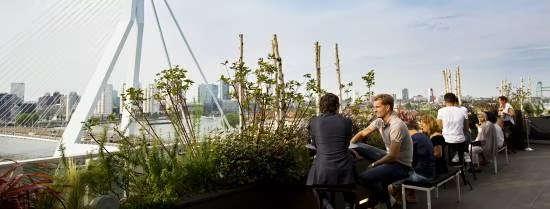What does the sea level rise mean for a city like Rotterdam, 80% of which lies below sea level? How are we reacting as a city to the current COVID-19 pandemic, and what are we learning from it in the case of a future pandemic? What would we do if we were faced with a cyber attack? These are all matters Arnoud Molenaar (59) deals with as the Chief Resilience Officer of the Municipality of Rotterdam.
“We have entered an era of great change that requires adaptability from us as individuals and as the city of Rotterdam. We have to learn to navigate through each other’s shocks and stresses.” Arnoud Molenaar speaks passionately and realistically about doomsday scenarios for which Rotterdam is preparing. There is one question that is consistently relevant in his work: how can we prepare for inevitable changes? It turns out that you can quickly move from catastrophic thinking to seeing new opportunities.
Resilience
Arnoud has a job that challenges you to be innovative. “It energises me to actively contribute to the future sustainability of the city of Rotterdam. All the major changes we are facing require resilience,” says Arnoud. On a strategic level, he is responsible for how Rotterdam deals with these changes. The city is a forerunner when it comes to this. In 2016, Rotterdam was the first city in The Netherlands to launch an integrated resilience strategy. In collaboration with partners within the city, a second version will follow in 2021. According to Arnoud, resilience is an ability that the city and its people need to master. “We need to be prepared. If something happens that turns our lives upside down, we have to bounce back and ensure that we come out stronger.”
Bospolder-Tussendijken
Arnoud finds the pilot ‘Bospolder-Tussendijken’ (Resilient BoTu 2028 Project) to be a good example at a district level. The plan is intended to make the district more resilient in ten years’ time in terms of social cohesion, safety, and climate resilience. “Here too, we are collaborating with EUR when it comes to research into the resilience of this district. Especially now that we are dealing with the COVID-19 pandemic, we see that many of the informal networks in Bospolder-Tussendijken are important building blocks for resilience.”
The Municipality as a Partner
The Rotterdam strategy to show resilience towards change requires a new way of working from the government. “The municipality has become more of a partner when it comes to realising change. A partner that collaborates with other stakeholders such as private parties, housing associations, civil networks and knowledge institutes like Erasmus University Rotterdam.” He sees this collaboration in projects like ‘Rotterdam. Sterker Door.‘, a metropolitan approach to ensure that Rotterdam emerges stronger from the crisis. EUR is also a partner in this project. Prof. Jurian Edelenbos and his team from Vital Cities & Citizens (VCC) conducted research into resilience within Rotterdam and transferred their findings into policy letters. With these policy letters, VCC provided reflection and concrete advice. For example, how the municipality of Rotterdam can deal with the social resilience from the districts and neighbourhoods of the city in response to COVID-19. Arnoud: “This ‘Rotterdam. Sterker Door.’-approach is our answer to corona. It is the municipality’s initiative that is implemented for and with the city. Professor Jurian Edelenbos helped us make the concept of resilience more specific. What does it mean? We collected information on how other cities are responding to the pandemic, and that led to a knowledge and inspiration document. In this way, we contribute from all sides towards a more resilient society and economy.”
A Stronger Collaboration between Science and Government
If it were up to Arnoud, the collaboration between science and the government would only get stronger. An opportunity for collaboration would be when it comes to knowledge about the effect of the current approach to the crisis. “I would very much like to carry out an analysis together with EUR into where we stood, where we are vulnerable, what we have learned and how we can transform that information into action to be better prepared in the future.” The aim of VCC is to strengthen the quality of life in cities by forming networks with municipalities, civil society organisations, other initiatives, companies and the creative industry to share knowledge with each other on the basis of scientific research. Jurian: “How do residents deal with changes within their environments? How do cities make space for diversity? How do you ensure that residents feel like they belong? How do you ensure that they can actively contribute to the sustainable, fair, smart, resilient and inclusive development of the city and its citizens? These are questions that we look into at VCC. Our team consists of scientists from various disciplines; namely, psychology, sociology, public administration, pedagogical sciences, communication, arts and culture, history, developmental studies, economics and anthropology. I consider the collaboration between the municipality of Rotterdam, and with Arnoud Molenaar in particular, to be very valuable. Through their collaboration, we are working towards a resilient Rotterdam.”
The aim of VCC is to strengthen the quality of life in cities by forming networks with municipalities, civil society organisations, other initiatives, companies and the creative industry to share knowledge with each other on the basis of scientific research. Jurian: “How do residents deal with changes within their environments? How do cities make space for diversity? How do you ensure that residents feel like they belong? How do you ensure that they can actively contribute to the sustainable, fair, smart, resilient and inclusive development of the city and its citizens? These are questions that we look into at VCC. Our team consists of scientists from various disciplines; namely, psychology, sociology, public administration, pedagogical sciences, communication, arts and culture, history, developmental studies, economics and anthropology. I consider the collaboration between the municipality of Rotterdam, and with Arnoud Molenaar in particular, to be very valuable. Through their collaboration, we are working towards a resilient Rotterdam.”

